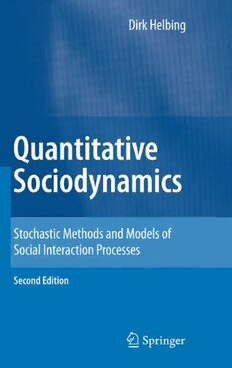
Quantitative Sociodynamics: Stochastic Methods and Models of Social Interaction Processes PDF
363 Pages·2010·5.194 MB·English
Most books are stored in the elastic cloud where traffic is expensive. For this reason, we have a limit on daily download.
Preview Quantitative Sociodynamics: Stochastic Methods and Models of Social Interaction Processes
Description:
This new edition of Quantitative Sociodynamics presents a general strategy for interdisciplinary model building and its application to a quantitative description of behavioral changes based on social interaction processes. Originally, the crucial methods for the modeling of complex systems (stochastic methods and nonlinear dynamics) were developed in physics and mathematics, but they have very often proven their explanatory power in chemistry, biology, economics and the social sciences as well. Quantitative Sociodynamics provides a unified and comprehensive overview of the different stochastic methods, their interrelations and properties. In addition, it introduces important concepts from nonlinear dynamics (e.g. synergetics, chaos theory). The applicability of these fascinating concepts to social phenomena is carefully discussed. By incorporating decision-theoretical approaches, a fundamental dynamic model is obtained, which opens new perspectives in the social sciences. It includes many established models as special cases, e.g. the logistic equation, the gravity model, some diffusion models, evolutionary game theory and social field theory. Moreover, it implies numerous new results and is relevant for various application areas, such as opinion formation, migration, the self-organization of behavioral conventions, and the behavior of customers and voters. Theoretical results are complemented and illustrated by numerous computer simulations.Quantitative Sociodynamics is relevant both for social scientists and natural scientists who are interested in the application of stochastic and synergetics concepts to interdisciplinary topics.
See more
The list of books you might like
Most books are stored in the elastic cloud where traffic is expensive. For this reason, we have a limit on daily download.
